The Ultimate Guide to Baby Swimming and Water Safety
Let’s find out what swimming is for a kid or a baby. And find the benefits of baby swimming.
In this article
What is baby swimming?
Swimming is an activity that involves moving through the water using arms and legs. One of the best ways to cool off on a hot summer day is in a cold lake or pool.
Swimming is an excellent exercise that provides benefits to the body in a variety of ways. Not only will it train your cardiovascular system, but it will also help you to build endurance and muscle strength. As a low-impact, full-body exercise, swimming is a great way to stay in shape. It is a great way to keep fit and have fun, and it’s also a life skill that helps you stay safe in the water. It can also be so relaxing.
One of the best things about swimming is that it helps your baby stay healthy. Swimming is a great way to help your child learn how to float on their back and kick their legs while they swim.
What types of safety should you take for your baby?
Safety is a topic that is important to baby swimmers and their parents. It’s no secret that babies love to swim and splash around in the water, but there are some ways to keep them safe while they do so.
- First of all, you should always have your baby wear a life jacket when they’re swimming. This provides them with extra support if they end up sinking underwater or if they get caught in an undertow. The life jacket also makes it easy for someone else—such as a lifeguard—to rescue your child if necessary.
- If you want your baby to learn how to swim safely, start by teaching them how to float on their back in the water rather than on their stomach. By sailing on their backs, children will develop upper-body strength; this will help them swim longer distances without getting tired because they won’t be holding onto something heavy like a boat or buoy (this may also help prevent drowning).
- Make sure that your baby is wearing a diaper (even at home).
- Always stay within arm’s reach of your baby when they’re swimming. This will allow you to keep an eye on them at all times and avoid accidents if something unexpected happens.
- Never leave your baby alone in or near water.
- Don’t swim with your baby in rivers and oceans. Where fast-moving water is hazardous and currents are hard to gauge.
- Don’t force your baby to swim for longer.
- Always make sure that they are comfortable in the water or not.
- Keep all electrical appliances away from the pool area.
- Always make sure that there are earplugs in your baby’s ear, goggles in the eyes, and a cap and Swimsuit on their body.
What is the importance of baby swimming?
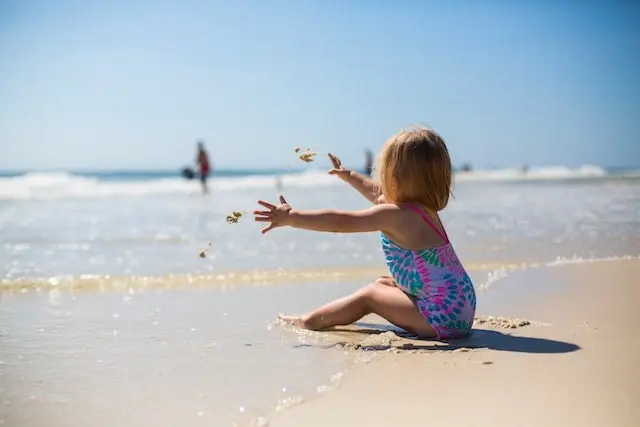
So you want to know the importance of baby swimming?
Well, babies indeed need to be able to move around and get some exercise. But there are so many other reasons why swimming is essential for babies. Every parent wants their babies to stay healthy and fit, and grow in every possible way. So, swimming helps them to build coordination. And it also develops breathing skills and helps them to relax their body, teaches them to enjoy themselves without worrying about anything and that is a very important lesson for a child growing up in the world today!
1. Swimming can help to reduce drowning
How to stay safe in the water is a great life skill. In the United States over 3500 deaths annually occur due to drowning. Which is completely preventable. So, it is a great skill, especially for those children who are 4 or less than 4 years of age. Early swimming lessons also increase the interest towards swimming in future.
Even after swimming lessons, do not replace your supervision in the bathtub and pool. Only let them go alone around the pool or backyard while wearing a swim floaty.
2. It strengthens the cognitive function
If your child learns to swim at a very young age then it develops better visual-motor skills. This may improve:
- Reading skills
- Language development
- Academic learning
A four-year study of more than 7,000 children by Griffith University in Australia suggested that children who swim have advances in physical and mental development compared to their peers who don’t swim. Studies show that children who swim are 20 months ahead in terms of solving problems and following instructions than their peers who do not swim.
3. Aids muscle development
For sure baby swimming develops muscles in children. It also helps to make the heart, lungs, and blood vessels stronger. Swimming is a whole-body exercise. It improves the muscle as well as provides internal benefits. It helps to move all the joints in the body.
4. Swimming may improve confidence
In the water, babies can learn new skills with their parents. It also helps to build a great connection between the child and the parents. Swimming boosts their rate of improvement. A study proves that swimmer babies are more confident than non-swimmers. They easily adapted to a new situation. They had better self-control. Swimmers had more desire to succeed, more comfortable in social situations than non-swimmers.
5. Boosts appetite
Every day swimming practice uses up much of your baby’s energy, marking an increase in appetite afterwards. All of that physical exertion in the water, as well as the energy it takes their little bodies to stay warm, burns a lot of calories.
6. It improves the quality of the relationship between parents and baby
In the pool, all your attention is focused on your baby. You and your partner both are busy playing with the baby. It improves the bond and creates plenty of unforgettable moments together.
7. Gives sound sleep
Swimming and playing in the water make your baby tired. So, you can notice an improvement in your sleep pattern after starting swimming.
When is your baby ready for swimming?
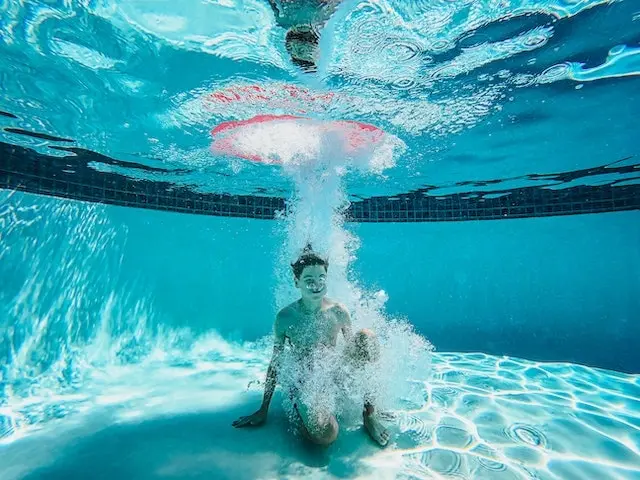
You might be surprised to know that babies had no age to swim. But it is not very safe to take a newborn to the pool. Only after 6 months you can take your baby to the pool. And can join parent-baby swimming classes. In this case, the bond between you and your baby will be stronger and gradually your baby will learn the art of swimming.
Indeed, only after 4 years of age your baby can fully learn to swim. But it is very helpful for your baby to learn to swim quickly. Only under supervision take your baby to the pool.
Babies’ bodies are not adaptable to temperature as adults. So make sure that the temperature of the water is always 32 degrees Celsius.
When you are joining the swimming class make sure your baby is happy in the water otherwise do not rush. But if your baby loves to play and splash in the water then play with him or her, it will encourage him or her to learn to swim further.
What are the required tools for a baby to swim?
- Swim diaper
- Swim hats
- Swim goggles
- Water shoes
- Life jacket
- Swimsuit
- Swim vests
- Swim aids
- Toys
- Earplugs
What resources are there for a baby to swim?
Kids who are less than four years old do not need to join a baby swimming course. You by yourself can teach them to survive in the water. And after getting old enough you can choose a local swimming centre to join. Firstly it is more important for your baby to learn and enjoy the water. For that, you should play with your baby in the water and spend some quality time with your little bundle of joy.

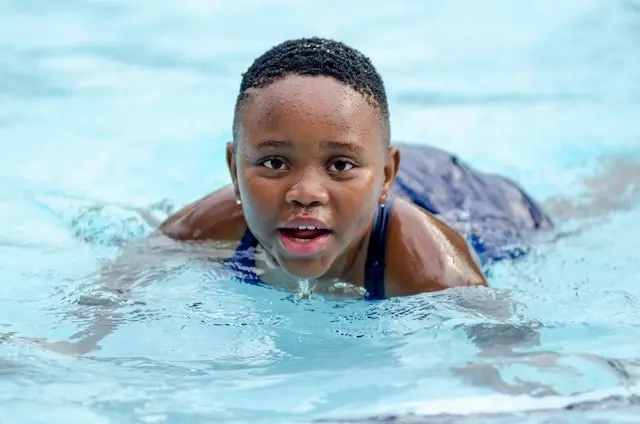

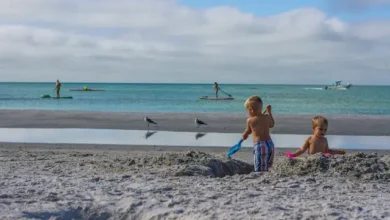
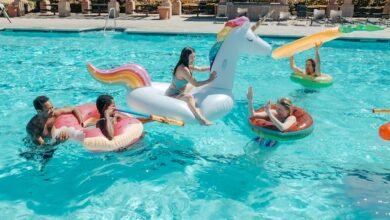

Greetings! Very helpful advice in this particular article!
It’s help to improve swimming skills of my little baby.
Thanks a lot for sharing!